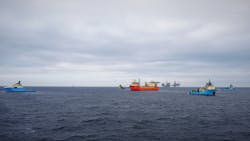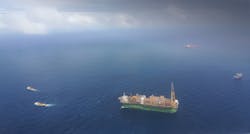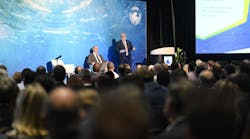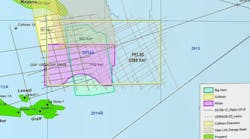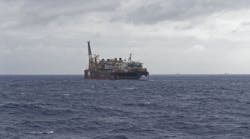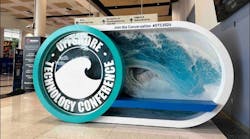Jessica Tippee • Houston
Transocean gearing up for ultra-deepwater market recovery
Transocean Ltd. and Ocean Rig UDW Inc. have entered into a definitive merger agreement under which Transocean will acquire Ocean Rig in a cash and stock transaction valued at about $2.7 billion. The board of directors of each company have unanimously approved the deal, which is expected to be completed during 1Q 2019. The transaction is subject to the approval of both Transocean and Ocean Rig shareholders and the satisfaction of customary closing conditions, including applicable regulatory approvals. The merger is not subject to any financing condition. Upon completion of the merger, Transocean’s and Ocean Rig’s shareholders will own about 79% and 21%, respectively, of the combined company.
Ocean Rig’s fleet includes nine high-specification ultra-deepwater drillships and two harsh environment semisubmersibles. The company also has two high-specification ultra-deepwater drillships currently under construction at Samsung Heavy Industries. These two newbuilds are expected to be delivered in 3Q 2019 and 3Q 2020, respectively.
Jeremy Thigpen, Transocean’s president and CEO, said: “The combination of constructive and stable oil prices over the last several quarters, streamlined offshore project costs, and undeniable reserve replacement challenges has driven a material increase in offshore contracting activity. As such, adding Ocean Rig’s premium assets to our industry-leading fleet provides us with an increased number of the modern and highly efficient ultra-deepwater drillships preferred by our customers, and better positions us to capitalize on what, we believe, is an imminent recovery in the ultra-deepwater market.”
Leslie Cook, principal analyst, upstream supply chain, at Wood Mackenzie, said: “It is Wood Mackenzie’s view that the premium ultra-deepwater drillship market has reached the bottom and rates for some of the highest-spec assets have the potential to double in the next couple years as active utilization begins to tighten. Operators are already demonstrating a preference for newer rigs that offer greater efficiency in their drilling programs.”
Cook said: “As rates begin to float back up, the need to keep drilling costs down will drive demand for these newer rigs that can offer efficiency gains. By buying Ocean Rig, Transocean is positioning itself to offer the industry premium rigs at competitive day rates. This is a winning deal – for Transocean, for Ocean Rig, and for the industry.”
In addition, Transocean has retired the ultra-deepwater drillship C.R. Luigs and the midwater floater Songa Delta.
Culzean FSO installed in the North Sea
In mid-September, Maersk Supply Service completed the tow and installation of the FSO Ailsa at the Total-operated Culzean field in the UK central North Sea. The FSO was towed from Sembcorp Marine’s Tuas Boulevard Yard in Singapore.
The company delivered the project as an integrated solution, including project management, engineering, procurement, and execution of offshore work scopes. Eight Maersk Supply Service vessels carried out the marine operations.
Hook up of the FSO Ailsa at the Culzean field in the UK central North Sea. (Courtesy Maersk Supply Service)
Two of Maersk Supply Service’s newbuild M-class anchor handling tug supply vessels were used throughout the project. The Maersk Master performed the tensioning of 12 50-metric ton anchors in two vessel mobilizations. It achieved, the company claims, the highest tensioned mooring system in the North Sea at 723 metric tons. The Maersk Minder installed 12 140-mm (5.5-in.) mooring chains and sheathed wired in two mobilizations.
Egina FPSO moored offshore Nigeria
Aqualis Offshore has completed its position keeping role for the Egina FPSO, which is now safely moored offshore Nigeria. Its team of position keeping masters on board the vessel first oversaw the installation of the four first mooring lines, which took the FPSO to storm safe condition. The team then continued their role for the installation of four further mooring lines.
In total, the Egina FPSO is now spread moored on 16 mooring lines (4x4). The company delivered the position keeping work as a subcontractor to EPCIC contractor for the FPSO, Samsung Heavy Industries.
The 330-m (1,083-ft) long Egina FPSO is expected to have an oil storage capacity of 2.3 MMbbl. (Courtesy Aqualis Offshore)
“The entire position keeping job and installation of the first eight mooring lines was completed safely and on schedule,” says Phil Lenox, director – Asia Pacific, Aqualis Offshore.
Total is the operator of the Egina field, which is located some 130 km (81 mi) off the coast of Nigeria at water depths of more than 1,500 m (4,921 ft).
The FPSO is about 330 m (1,083 ft) in length and is expected to have an oil storage capacity of approximately 2.3 MMbbl of oil.
Coral South FLNG hull construction under way
Construction of the hull for the Coral South floating liquefied natural gas (FLNG) vessel has started at the Samsung Heavy Industries (SHI) shipyard in Geoje Island, South Korea. Eni and its Area 4 partners recently held a first steel ceremony, which occurred 15 months after the project’s final investment decision.
The FLNG construction started in March of this year in Singapore with the steel cut for the ship’s turret.
SHI is expected to start construction of the topsides modules at the end of the year.
The 439-m (1,440-ft) long, 65-m (213-ft) wide, and 38.5-m (126-ft) deep FLNG vessel is expected to be completed by the end of 2021. The facility will be moored in 2,000 m (6,562 ft) of water in Area 4 of the Rovuma basin offshore Mozambique. First gas is expected in 2022.
Eni is the delegated operator for the Coral South FLNG project. The Area 4 participants are Eni (25%), ExxonMobil (25%), CNPC (20%), Empresa Nacional de Hidrocarbonetos E.P. (10%), Kogas (10%), and Galp Energia (10%). •


